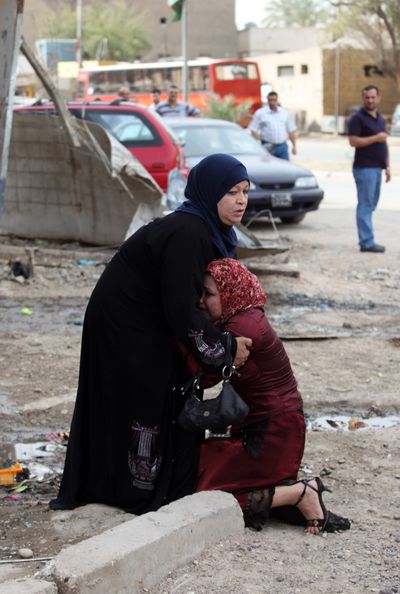Deadly suicide bombs revive fears in Iraq
Two blasts kill scores following Sunni threats

BAGHDAD – Two large suicide bombings Thursday renewed fears among Iraqis that Sunni insurgents are regaining strength and lethality as the U.S. military has started disassembling its massive wartime architecture.
The blasts, which killed more than 80 people in the bloodiest day here this year, came after Sunni insurgent groups warned that they would step up attacks against U.S. troops and Iraq’s Shiite-led government, which is backed by the United States.
One of the attacks killed 53 Iranian pilgrims and two Iraqis at a restaurant in Diyala province. The other killed 28 Iraqis in a predominantly Shiite district of central Baghdad.
The insurgent groups, which controlled vast areas of Iraq in 2006 and 2007, had lost considerable support, mobility and financial backing over the past two years. But Thursday’s bombings follow a series of attacks that began last month after the Islamic State of Iraq, an umbrella organization that includes the Sunni insurgent group al-Qaida in Iraq, announced it would carry out a wave of violence code-named “The Good Harvest.”
The violent campaign coincides with plans for a U.S. pullback. The first deadline in a phased American withdrawal agreed upon by Iraq and the U.S. comes this summer, when combat troops are supposed to move out of urban areas. Top U.S. commanders have recently said the Iraqi government may ask them to keep American forces in cities in northern Iraq, where the insurgency remains entrenched, beyond the summer deadline. In Baghdad, the military has closed some inner-city bases and small outposts, but appears intent on keeping American soldiers at urban facilities it shares with Iraqi troops well beyond the summer.
The attacks, which happened shortly after noon, came as an Iraqi military spokesman announced the capture of Abu Omar al-Baghdadi, the mysterious leader of the Sunni insurgent group al-Qaida in Iraq. A U.S. military spokesman said Thursday night that the military could not confirm the report. U.S. intelligence officials have said Baghdadi is likely a fictional character created by non-Iraqi Arab leaders of the insurgent group to give it an Iraqi face. Iraqi authorities have in the past made similar assertions about Baghdadi’s arrest that turned out to be wrong.
Mariam al-Rayyis, a senior adviser to Prime Minister Nouri al-Maliki, said the recent spate of bombings has not prompted the al-Maliki government to contemplate easing the rigid withdrawal timeline it insisted on last fall during contentious negotiations with American officials.